As mentioned in Part 1, many New Who monsters have left a significant impression on Whovians—baddies and softies alike. We’re all familiar with aliens like the distinctive Slitheen, the wise Face of Boe, the sinister Vashta Nerada, and the terrifying Silence (wait, didn’t I mention them last time? I can’t remember…) among others. All worthy inventions, no doubt, but what about the lesser acknowledged creatures? There are many monsters that go unmentioned, or at least misjudged for one reason or another. It’s time to unearth more of these hidden gems, quite literally.
Cassandra (‘The End of the World’, Series 1; ‘New Earth’, Series 2)
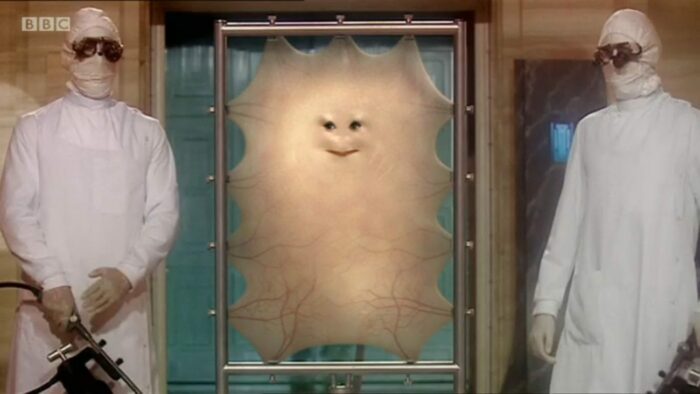
Okay, hear me out. Cassandra is renowned within the Doctor Who fandom (and on the internet in general) for being a “bitchy trampoline” who looks ridiculously silly, and I sure don’t blame people for making memes out of it. But as a firm advocate for her, I say there’s actually a lot more to Cassandra than meets the eye. Introduced in the far, far future in ‘The End of the World’, the sheet of skin in need of constant moisturising and stretched to the edges of a metal frame is wheeled into the main room on Platform One by her assistants. Claiming to be the “last pure human”, Cassandra had (at that point) 708 operations to maintain her form, frowning upon other types of humans who have altered themselves to evolve. She’s seemingly there to witness the end of the world along with other alien races—let me use this opportunity to flag up her iconic line referring to Britney Spears’ ‘Toxic’ as a “traditional ballad”, an incredible choice of song to use as a send-off. However, Cassandra has an ulterior motive: to get compensation money by destroying the space station and escaping via teleportation. Her plan fails, as the Doctor reverses the teleportation, and without her moisturising assistants, she dries out and explodes.
It’s not the last we see of Cassandra, as she returns in ‘New Earth’, surgically put back together, Humpty-Dumpty-like, with the skin from her backside. This time she has a new assistant, a loyal, home-grown clone called Chip, who helps Cassandra’s essence to leave her trampoline form and possess Rose. Although Cassandra planned to steal money and Rose’s body among others “younger and less common” as she puts it, Cassandra does end up changing by the end of the episode. Initially, she looks upon the sick patients that the Sisters of Plenitude are keeping as lab rats with disgust, but after briefly being inside one of their heads, she truly learns how to empathise. At the end, Cassandra possesses Chip, but since he’s only a half-life, she’s dying in his body. The Doctor does her a final favour by travelling back to a party she attended back when she looked human, so she gets to tell herself that she looks beautiful before she dies in her own arms.
At first, Cassandra is a fairly one-dimensional, monstrous villain, but she becomes more interesting when fleshed out (literally) in her second appearance. Similar to the Half-Face Man mentioned in Part 1, Cassandra’s endless alterations bring up the philosophical question of whether she’s truly human, and living beyond her time makes her even more removed from humanity. However, her fear of death is extremely relatable, and her final scene is a genuine tear-jerker. She’s extremely privileged and classist, which is a great angle for a villain like her, but also highly entertaining and fun to watch. It’s significant as well that Cassandra makes reference to when she was “a little boy”, confirming that she’s transgender. Samantha Riedel wrote a fantastic article about Cassandra as a trans character—go give it a read!
Krillitane (‘School Reunion’, Series 2)
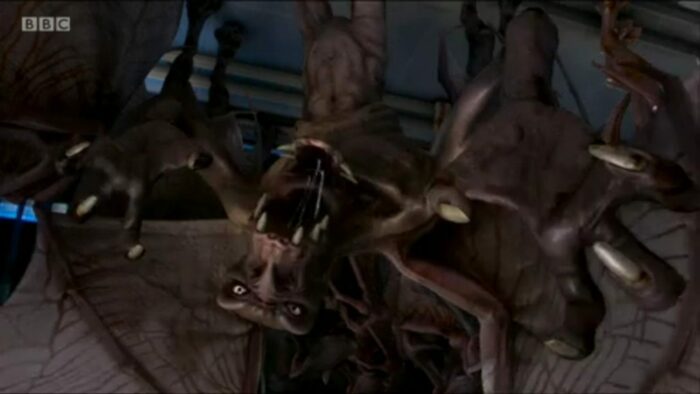
Series 2 also brought us the Krillitanes, a horde of gargoyle-type creatures that disguised themselves as teachers to infiltrate Deffry Vale High School in London. Bringing children’s nightmares to life, the aliens sleep in the school, hanging upside-down from the ceiling like bats. Their intention is to advance the intelligence of the schoolchildren using Krillitane oil consumed via chips in the canteen, and use this intelligence alongside their imagination to crack the Skasis Paradigm, a mathematical equation that holds the key to controlling the universe. It’s a powerful idea contrasted quite hilariously with the school setting. Fortunately, the Krillitanes’ seeming invulnerability is defeated by a kryptonite-like weakness: their own Krillitane oil. The reason for this is that their physiology has been changed so often that their own oil is toxic to them, burning the skin. Much like Cassandra and the Half-Face Man, this again ties in with the idea of constant physical alterations that guide them away from their original nature, going so far as to manifest a fatal flaw in this case.
Sinewy, purple-tinged skin, fleshy wings, and prominent teeth are all current physical features of the Krillitanes when they’re not presenting in human form. I say “current” due to their frequent changes from stealing aspects of every species they conquer—an obvious colonial metaphor. This ability poses a particular threat considering the Doctor’s regenerative biology; if he were to be defeated by the Krillitanes, it could be catastrophic. Interestingly, Brother Lassar (the head honcho Krillitane portrayed by Anthony Head) instead attempts to seduce the Doctor into joining forces with him, asking him to become a “god” at his side and use the power of the Skasis Paradigm for good. This makes him a rather manipulative villain, playing off the Time Lords’ authoritarian tendency for maintaining the status quo, which he knows the Doctor despises. Of course, Lassar and the other Krillitanes are inevitably defeated, but not before an outstandingly theatrical performance by Anthony Head, making the monsters just that bit more appealing.
The Plasmavore (‘Smith and Jones’, Series 3)
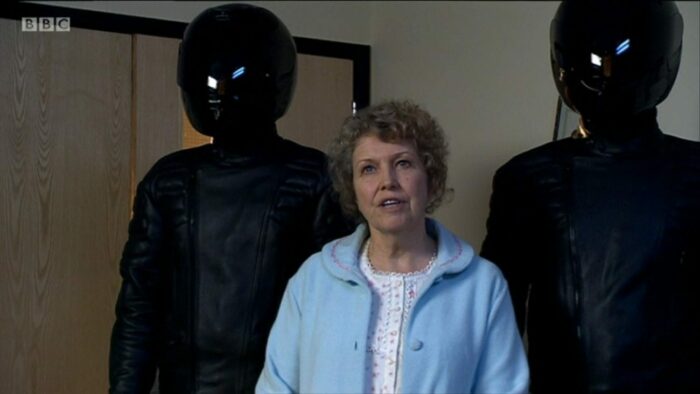
Inhabiting a human form, this dastardly monster poses as an elderly hospital patient in order to bypass execution by the Judoon. As a species, the Plasmavores are notorious intergalactic criminals, this particular one having fed on a child princess which led to her runaway status. To help with her killings, two Stig-like bodyguards follow the Plasmavore and hold down her victims while she drains their blood using an inoffensive-looking straw. She is vampiric in how she kills—it’s no coincidence that her first victim is called Mr Stoker, a reference to the author of Dracula. His rich blood from fine wine and dining made him the Plasmavore’s first choice for a meal, but this reference to his wealth alongside her having previously killed alien royalty leads me to deduce that she’s choosing to literally eat the rich, so I can’t exactly hate her. The blood has a practical use, however; she assimilates it to pass as human, thus evading detection by the Judoon’s scanners.
The Plasmavore’s vital mistake is made when she drains the Doctor of blood. Since he appears human, she assumes this will keep her concealed, but it actually makes her identifiable since his blood is alien. The Doctor purposely sacrificed himself so she’d be caught, but the scene where the Plasmavore kills him is quite horrifying. She also planned to amplify the MRI machine to fry everyone’s brains in the vicinity and aid her escape, which very nearly happened. A multi-threat villain is always compelling, all the more so with the juxtaposition against her appearance as a gentle old woman. Plus, her final words as she gets zapped by a Judoon laser are “BURN IN HELL”, which certainly leaves an iconic lasting impression.
Bannakaffalatta (‘Voyage of the Damned’, 2007 Christmas Special)
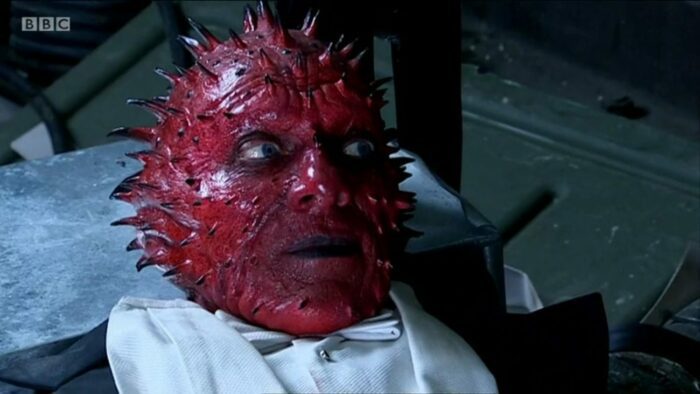
Part of the ragtag group of allies aboard the spaceship Titanic, Bannakaffalatta (from the planet Sto) was a cyborg Zocci—small, red, humanoid aliens with black-tipped spikes all over their heads. We never see any other Zocci, only the similar species called the Vinvocci in ‘The End of Time’, but Bannakaffalatta left an impression on me. Due to an unknown accident, he was converted into a cyborg which he feels ashamed about, since cyborgs are apparently discriminated against on his home planet. There’s an obvious gay metaphor here, since Astrid (Kylie Minogue) tells him: “But everything’s changed now. Cyborgs are getting equal rights. They passed a law back on Sto. You can even get married”. He does however have a crush on Astrid which is very sweet.
In a dramatic scene where the characters are surrounded by the evil Hosts, Bannakaffalatta releases an electromagnetic pulse that kills the baddies in the vicinity, allowing the others to escape. However, the blast wipes out most of his power, causing him to die. It’s a very commendable yet sad sacrifice; I was emotional to see him get killed off in the episode. The EMP transmitter is taken from Bannakaffalatta’s body and used to kill other Hosts, so his memory lives on.
Hath (‘The Doctor’s Daughter’, Series 4)
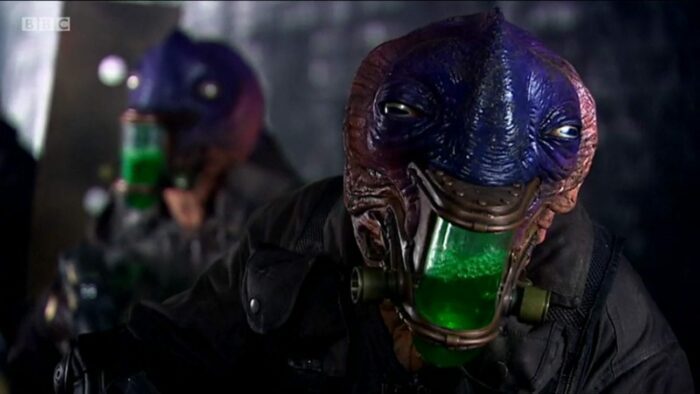
A kind of reptilian, almost bird-like, humanoid creature, the Hath inhabited an Earth-type planet called Messaline alongside humans in the far future. When the mission commander died, a power vacuum occurred, sparking a battle between the two species as they each sought the “Source” to take control and wipe the other out. What they don’t realise is that the Source is a terraforming device intended to make the planet fully habitable for both the Hath and the humans, and that the soldiers extrapolated the reason for battle, misconstruing the original intent. Near the beginning of ‘The Doctor’s Daughter’, one of the Hath by the name of Peck kidnaps Martha; aside from the human army’s perceptions of them as enemies, we mostly see the aliens from her empathetic perspective.
Communication is difficult for the Hath due to the nutrient liquid breathing mechanisms attached to their mouths, but Martha manages to understand them enough to work alongside them. Peck is injured when the tunnel is sealed at the start, so Martha relocating his shoulder creates a bond between them and the rest of the Hath. The humans intend to wipe out the Hath, and although the Hath plan on wiping out the humans, the aliens are somehow easier to sympathise with, as they show no violent tendencies towards Martha as opposed to the humans who lock up the Doctor and co. The event that generates the most emotion towards the Hath is when Peck sacrifices himself to save Martha’s life, drowning in a sort of quicksand—it’s a genuinely tragic moment. In the end, the humans and Hath are able to cohabit in peace, which is a satisfying conclusion for these rather pleasant creatures.
Saturnyns (‘The Vampires of Venice’, Series 5)
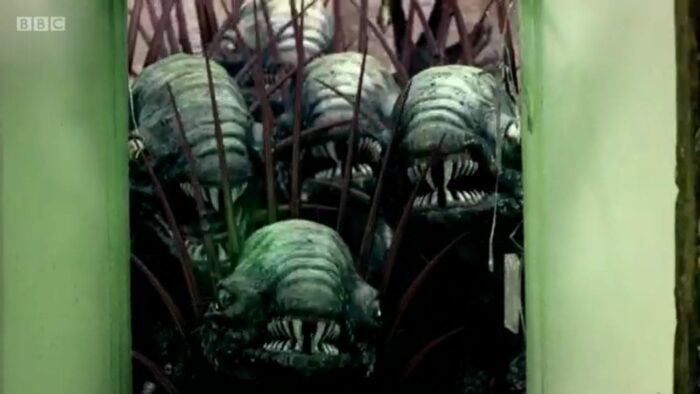
Also known as Sisters of the Water or Fish Vampires, the Saturnyns were initially assumed to be vampires due to their human form, long fangs, lack of reflection, and aversion to sunlight. However, they were revealed to be aquatic creatures using perception filters, much like the Krillitanes used a morphic illusion; their true form consists of a fish head with protruding eyes, an upright torso with bug-like appendages, and a lobster tail. Along with her children, the leader of the pack, Rosanna Calvierri, fled their home planet due to the “silence”, arriving in Venice. Only the males of the species survived the journey, so Rosanna caused a city-wide quarantine by lying about a plague outbreak, then set up an ‘educational academy’ for young women. In reality, it was a cover for her to turn the young women into Saturnyns by gradually draining their blood and replacing it with their alien blood so that procreation was possible and the species could thrive. Not only this, Rosanna attempted to conjure a tidal wave to sink Venice so that the Saturnyns had an underwater habitat to live in.
The design of the creatures’ true form looks fab, and the combination of parts that each emulate different animal biology is a great concept. A particular feature I like is that the Saturnyns drain their victims of moisture rather than just blood—it still ties in with vampirism, but makes more sense with the aquatic connection. Although Rosanna is essentially stealing young women away from their families and turning them into Saturnyns to mate with the males, which is extremely creepy, there’s a degree of sympathy in how she describes herself as a “refugee” and her motivation is to save her family. Once her plan has been foiled and the newly-turned women killed, Rosanna jumps into the water to be eaten by her children, an ironic ending considering this is how she killed one of the girls earlier. It’s assumed that the rest of the species died with her, as this is what she indicates would happen.
Minotaur (‘The God Complex’, Series 6)
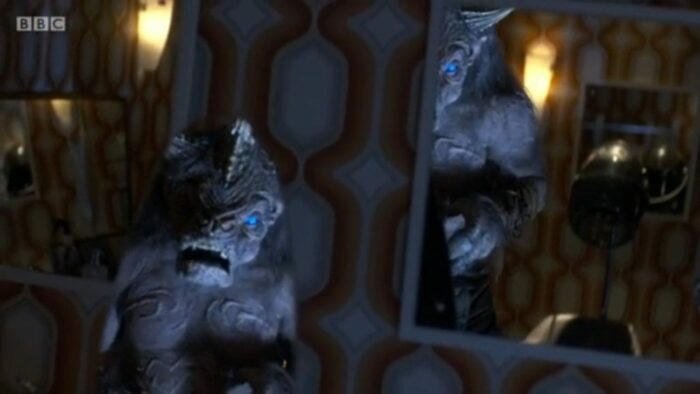
Another mythological entry is the Minotaur, a half-man, half-bull creature from Greek mythology that is a little more… well, alien, in Doctor Who. He’s extremely tall, almost too tall for the corridors of the hotel he wanders, as his multiple horns scrape against the lower parts of the ceiling. Staple cloven hooves are in place of his feet, his skin is wrinkled and hairy all over, and his eyes glow a gentle blue. In the original mythology, the Minotaur resided at the centre of a labyrinth designed to hide him from view; in ‘The God Complex’, he lives in a 1980s style hotel that shifts and changes constantly, emulating a similar feel. Space travellers end up getting trapped inside the hotel, and each room is allocated to a specific person, targeting their worst fear or nightmare. Once they start to “praise him”, the Minotaur follows and feeds on the people in the hotel, killing them.
At first, the Doctor assumes that the creature feeds off of fear, but then realises it’s faith instead. It pulls in people who have a strong belief in something, whether that be religion, luck, or a person. If the person lets go of their faith, the Minotaur dies. The hotel is actually a prison ship that he was locked in by his subjects after they overthrew him, so the people are his only food source. After so much time had passed, the Minotaur wanted to die, but was unable to while he was still being provided with food. Amy letting go of her faith allowed the Minotaur to finally die, but right before that, he expressed pity for “an ancient creature drenched in the blood of the innocent”—although it seems he’s talking about himself, he suggests it’s a reference to the Doctor, creating a sympathetic parallel between the two aliens.
The Teller (‘Time Heist’, Series 8)
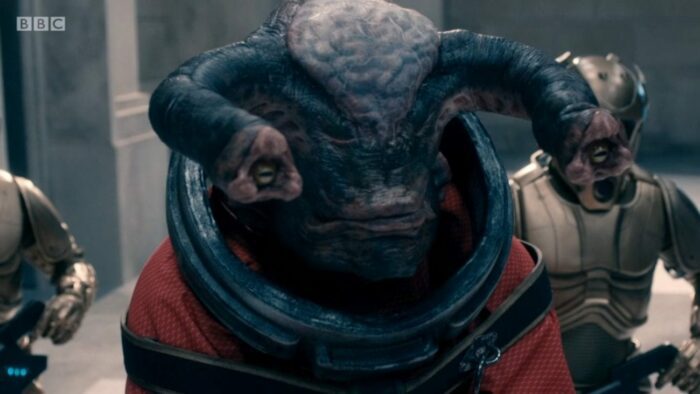
Described as ‘the ultimate CCTV system’, the Teller was a large, telepathic creature with two eye stalks on either side of its head and a brain visible under a slight film on its forehead. It was used as a type of security guard at the Bank of Karabraxos, able to scan people’s thoughts and detect guilt that would indicate a plan to steal from the bank. Once identifying potential criminals, the Teller would emit an energy that caused their brain to liquify, and their heads to become partially concave. This seems villainous, as it’s not exactly an accurate way of weeding out thieves, and brain destruction is an extreme way of dealing with them. However, the Teller is being forced to work for Madame Karabraxos, as she is keeping the only other of its species hostage. An orange straitjacket is also worn by the alien to control it.
Due to the imprisonment of the Tellers, the Doctor frees them from the bank and takes them to an isolated planet where they can thrive, away from the telepathic noise of others’ thoughts. It’s easy to feel sympathy for the Teller, as a creature who has been trapped by humans and manipulated into harming others. The hint of romance between the two Tellers also emulates that of the Crooked Man and the other of its species from ‘Hide’, mentioned in Part 1. Always glad to see a happy ending for monsters that have suffered!
Dryads (‘Knock Knock’, Series 10)
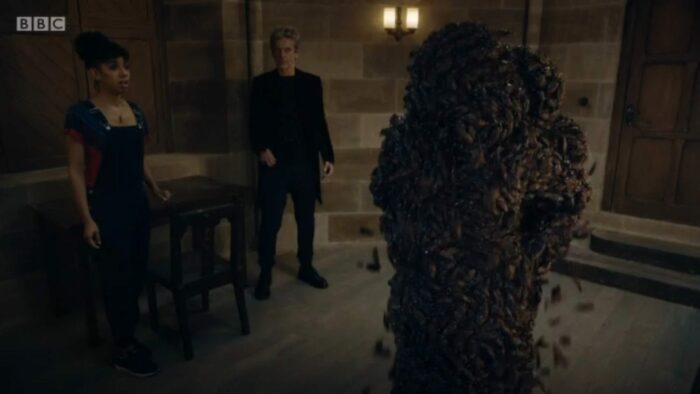
Keeping with the Greek mythology theme here, the insectile alien Dryads are named after mythological tree spirits that would specifically inhabit oak trees. In Doctor Who, they lived in the floorboards and walls of a house owned by the Landlord (David Suchet) and fed off the students currently residing there. The Landlord’s mother (Mariah Gale) contracted a terminal illness in 1947, and one night her son discovered and brought the Dryads to her to cheer her up. Unbeknownst to him, the bugs were activated by the sound of his mother’s music box, and they began to transmute her into wood, preserving her body from the illness. To maintain this, the Dryads needed to be fed, hence why the Landlord would lure students to his home by offering reduced rent. Mortified by what her son had been doing to keep her alive, his mother eventually controlled the Dryads into consuming them both.
Resembling large cockroaches, the Dryads had a brown exoskeleton and luminous antennae. Vibrations and high-pitched tones such as tuning forks were used to summon or control them. Although the way the Dryads devour humans to feed off is perturbing, the contrast of this with their ability to heal and restore life makes them complex creatures. They could be easily dismissed since they basically just look like Earth bugs, but their multi-layered nature and almost neutral morals were what made them stick out in my memory.
Dregs (‘Orphan 55’, Series 12)
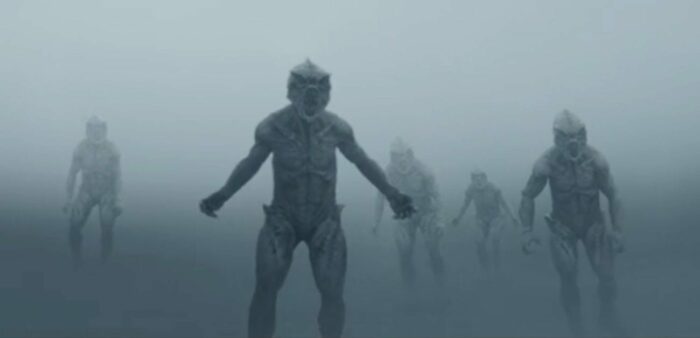
The Thirteenth Doctor and her companions encounter the Dregs on Orphan 55, which is later revealed to be Earth in a potential future timeline. Therefore, the Dregs are actually the remainder (hence the fitting name) of humans who survived the nuclear war that rendered the planet uninhabitable, but have mutated beyond recognition. The creatures have bleached-white skin with defined muscles and veiny structures running across their bodies, deep-set eyes, and an eroded nose and lips to reveal exposed gums and sharpened teeth. Visually, they remind me of the Hoix from the start of ‘Love and Monsters’ (and ‘Exit Wounds’ from Torchwood), particularly the mouth. Due to the change in environment, the Dregs also adapted to inhale carbon dioxide and exhale oxygen. One particular creature, known as the Dreg leader, seemed to be more intelligent and powerful than the rest.
Despite their drastic biological changes, the Dregs tragically remembered what happened to their ancestors. They represent what could become of humanity and our world should we let things like global warming, nuclear weapons, and war get out of hand, as the Doctor warns her companions that it’s not too late to prevent such a disastrous future—the moral message is very on-the-nose, but the concept is extremely interesting and disturbing. Being faced with monstrous creatures that are actually just human beings is an effective, frightening idea. It affected Ryan (Tosin Cole) so deeply that a Dreg featured in a nightmare of his in ‘Can You Hear Me?’ later in the series. They are certainly nightmare-inducing creatures.
So, there you have it! Both these lists aren’t extensive, of course (not even close)—there’s too many magnificent monsters in Doctor Who—but these are some personal faves of mine that I think are worth the attention. I’ll forever be here to defend the dark horse-type monsters that deserve to be valued.

